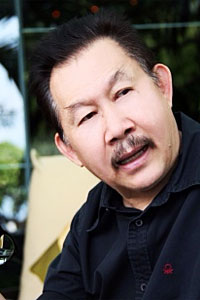The fact that Thailand's heavily polarised politics has deeply split the country into several colours, affecting even the daily interactions of couples at the household level, has become all too familiar for Thais over the past decade or so. The ongoing conflicts can also put some foreigners in an awkward, if not difficult, position.
That is what US ambassador Glyn Davies, like his predecessor Kristie Kenny, is experiencing while fulfilling his diplomatic mission in Thailand.
Ambassador Kenny became a target for sustained criticism after she went to visit some red-shirt sites. Inevitably, while the red shirts went on to boast that the US supported their ranks, the visits upset people on the other side of political spectrum.
In a matter of weeks after assuming his post, Ambassador Davies underwent a similar experience, especially after making a critical statement at the Foreign Correspondents Club of Thailand (FCCT) about Section 112 of the Penal Code or lese majeste law, a position unfortunately seen by many as "consistent with long-standing red-shirted rhetoric".
It has sparked a number of protests, with demonstrators taking to the streets in several provinces to demand the envoy return to his country.
A press picture of Ambassador Davies and his wife Jacqueline, with Weng Tojirakarn and his wife and red-shirt leader Tida Tawornseth, has become heavily politicised. While, by American standards, this might seem just like another harmless incident, it has unfailingly alarmed many sectors within the Thai polity, from Prime Minister Prayut Chan-o-cha and Democrat Party leader Abhisit Vejajjiva to political observers in the streets.
Owing to such obvious differences in cultural perceptions, Ambassador Davies' friends in Thailand have good reason to be worried if he carries on with this kind of high-profile visit and exchange in the future. The typical American courtesy graciously rendered to the red shirts, or to members of any other colour group, runs the risk of falling prey to an endless misinterpretation of true American intentions in Thailand.
At the FCCT, Ambassador Davies also reiterated the US call for a return to democracy in Thailand, and stressed that he did not want to "come across as wagging a finger". In view of Thai history as the only state in the region that escaped 19th-century colonisation unscathed, plus the rapidly changing geopolitics of the region evidenced in the emergence of China and Asean, "wagging a finger" really is rather out of place. No matter how good the intentions are, hard-line politicking is unlikely to bring the desired results as Thai society has long been painfully embroiled in a protracted and still unresolved conflict.
With the steady rise in income per capita, foreign governments and the United Nations commonly contend that Thailand is a relatively mature social system capable of self-management and an example for less fortunate societies. However, the simple fact that Thailand has failed to find effective solutions to its painful internal struggles for nearly a full decade indicates otherwise.
Despite a long series of systemic flaws in accord with a famous academic notion "a loosely-structured social system", in which nobody seems to perform their socially prescribed social role effectively, Thailand is nevertheless a state of deeply proud people who are conscious of their goals and ways of doing things.
As US President Barack Obama has said, "Thai politics is a complicated affair." Like it or not, to get things done in such a context, soft power is still the better way to go. Instead of pressing for quick structural change, strategic institution-building initiatives aimed at middle management in society is the most conducive to the widening and deepening of democratic culture. A stronger base for an effective independent intelligentsia is a prerequisite to sustain a functional democracy.
It is perhaps comforting to note that a lot of Thais from all walks of life are as equally eager as their American friends, if not more so, to see a democratic system restored, and hopefully a more functional one this time around.
Boonrak Boonyaketmala is a former professor and dean of Thammasat University, and a founding programme director in the social sciences and humanities at the Thailand Research Fund. Comments are welcome at reponses1234@yahoo.com.
